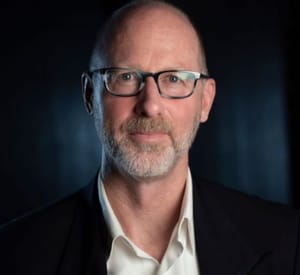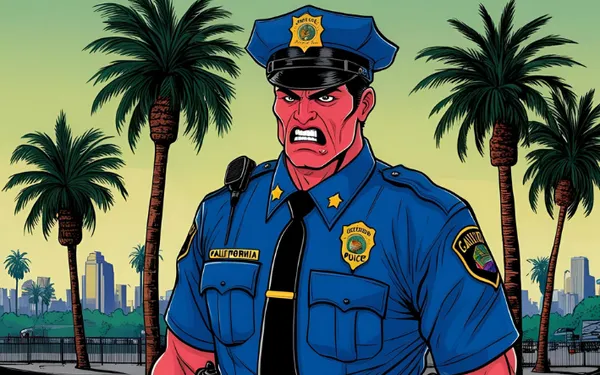Mass delusional psychosis is not something I invented but rather something I describe in my recent book, and its greatest victims are children. It is alive and well, and it shows no signs of abating.
Over the weekend I decided to leave Los Angeles and spend the day in nearby Ojai, a quaint small town located inland from the Pacific Ocean just south of Santa Barbara. The local residents are mostly traditional small-town conservatives mixed in with mostly harmless hippies. The latter group can be found playing acoustic guitar and singing Beatles songs on the weekend in the town square. That evening I had dinner at a local restaurant with patio dining, to be outdoors and enjoy the fresh air. After I had finished eating, I noticed a mother and daughter standing by the women’s restroom, the little girl appearing to be around eight years old. Both were wearing masks. As I walked past her, I looked down at the girl and asked, “Why are you wearing that on your face?” She stared at me blankly. Unable to respond, she looked up at her mother for an answer. What came out of her mother’s mouth was a hurried, frantic, nearly hysterical rambling of incoherent statements involving “schools” and “closures.” None of it made any sense. I said nothing, and the woman quickly became defensive and accusatory. “You have no right to intrude into our lives!” I turned to her and said, “Actually, I do. In fact, I have the obligation to tell you that you are abusing your child.” With wild, crazy eyes that reminded me of Sandy Cortez, she grabbed her daughter fiercely, clutching her to her chest face-first, and dragged the little girl into the bathroom, now screaming at me as she slammed the door shut and locked it behind her. Another hysterical woman, I thought to myself.
I returned to my table. A few minutes later, both mother and daughter passed through the patio—the daughter still masked—and disappeared down the street. Soon after that, a man appeared and began searching the patio, as if he were looking for something he had left behind. When he saw me, he walked over to my table and said, “Were you just speaking to my wife?” I told him that quite possibly I was. “Was she near the bathroom with the delightful little girl whose face was covered with a mask?” He asked if he could sit down. I told him, “Sure.” He then explained that he was a “professor” in the UCLA neurology department (but not a medical doctor or clinician) and that “all my colleagues have told me that there is nothing at all wrong with children wearing masks.” Furthermore, his wife was “very upset” by my “intrusion” into their lives. “Perhaps you were intoxicated, but this isn’t the proper forum to express your opinions.” I laughed and asked him what the proper forum would be to confront child abuse. He had no answer. Next I asked him how he feels about his wife putting a mask on their daughter. “I feel nothing.” He demanded that I apologize to his wife, which I refused to do. “What, exactly, would I be apologizing for? For upsetting her emotionally—or for trying to protect your child?” Abruptly, he stood up, muttered something about “Consequences…file a report with the manager…the police” and stormed out. The couple sitting next to me turned around, and the woman said, “How rude of that man. We would never mask our children. We want you to know that we support you, and we are just as fed up as you are with people like that.” They were visiting from Orange County, not surprisingly.
The husband and wife with whom I had the altercation perfectly exemplify the emasculated man and hysterical woman I describe in my book. Both appear to be highly educated, urban-dwelling professionals. The wife is living in a state of utter paralysis and chronic fear, unable to make rational decisions. She is emotionally unhinged. In her hysteria, she is harming her daughter by smothering her face with a diaper. Her husband cannot contain his wife’s emotional upset, and rather than firmly put his foot down and insist that she back off, he simply remains silent. He only takes action when she pressures him—perhaps threatens him—to extract an apology from the stranger who confronted her with the truth of her abuse. His motivation to confront me had little to do with any health concerns for his daughter; rather, he was terrified that his wife would punish him for her emotional breakdown. He is not an angry man but rather a castrated one.
A society ceases to function when its men can no longer display courage, and its women can only display hysteria. This couple has the luxury of surviving in this unhealthy dynamic because they live in a bubble in west Los Angeles, cocooned within the self-affirming pseudo-intellectualism of the university and the lunacy of the surrounding community. Their irrationality, their fear, and their inverted sex roles are never challenged. In fact, they are reinforced. The conversation I had with each of them may have been the first time in over two years that anyone had spoken to them honestly, face-to-face, about their mental illness and the harm they are causing their child.
I no longer speak with adults who choose to hide their faces behind masks in public. I do, however, speak with children whose parents choose to abuse them. It is our duty to intervene when a child is being harmed. We have long been told, “If you see something, say something.” It’s time we all began saying something whenever we see a child being smothered and suffocated by a face diaper. Expect an hysterical reaction from the parent, because that is most likely the source of the problem. And if that isn’t the case, then you have just offered moral support to the parent as well as social validation to the child that the mask needs to go—now. I’m often asked, “What can I do to help with this pandemic of fear…this mass delusional psychosis.” Well, here is your assignment: Speak up and speak out. You may just save a life.
Mark McDonald, M.D.
Psychiatrist and author of United States of Fear: How America Fell Victim to a Mass Delusional Psychosis







Member discussion